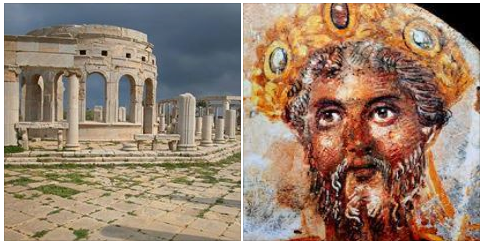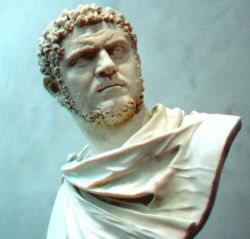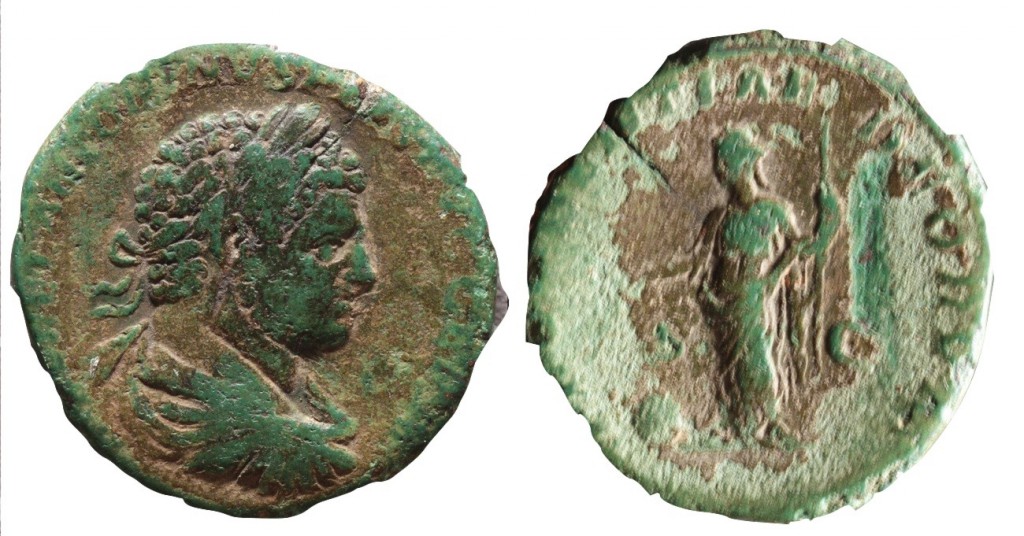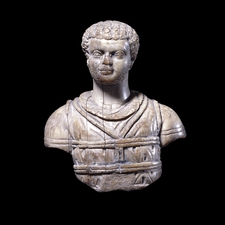It does appear a family feud bedeviled the reign of three of Rome’s emperors of African stock. Beginning with Septimius Severus who was born in Leptis Magna (Libya), in April 145. He later came back to refurbish the city of his birth. He reigned from AD 193 to 211 and was succeeded by his son Caracalla.
Septimius was the first black Roman emperor.
Severus’ wife Julia Domna hailed from Syria and the two had two sons Caracalla, the elder and Geta who was put under ‘damnatio memoriae’ i.e. images of him were ordered destroyed.

Severus hailed from an important Punic family from Libya, with its members often rising to ruling and senatorial positions. His cousin Gaius Septimius Severus became a consul, similar to a mayor, and chose Septimius as his legatus, or chief military leader. This began Septimius’ political career and set him up for ruling the empire amidst the political turmoil in Rome.
While Septimius was the governor of Pannonia Superior, a province on the Danube River, the emperor of Rome was murdered for being overly strict and not raising the wages of the army.
With the death of the elderly Pertinax, whom Septimius had served, there was need for a new emperor. Septimius ended up becoming emperor because he had loyalty and support from 16 legions. He also had more support from the Romans because of his connection with Pertinax, even giving him the title ”avenger of Pertinax.”
He is credited with reforming the Roman military. He disbanded the Praetorian Guard, a group of high-ranking military men, and set up a larger army increasing the security of Rome. To this end, he is reported to have devalued silver so he could pay more military men higher wages and then allowed the military to marry, which was not allowed before his reign and was generally met with favour. Septimius’ reforms of the military were one of his most notable accomplishments and, even on his deathbed, he noted the importance of a good military, telling his sons, ”Be good to one another, enrich the soldiers, and damn the rest.”

Securing his position even further, Severus proclaimed himself son of the Marcus Aurelius, a former emperor who had been given a status of god, indicating that he was divine. He gave the title of Caesar, the inheritance of his role as emperor to his son Marcus Aurelius Antoninus who was later called Caracalla.
From 208 to his death at York in 211 Septimius was in Britain fighting the Caledonians (from Scotland). After serving nearly 18 years as Rome’s emperor, Severus died (in Britannia, today’s England) during 211 AD. His body was burned on a pyre, in York.
When Severus died, Caracalla was 22 years old and his brother Publius Septimius Geta, 21. Although the father tried to keep the peace in his home, the family’s dysfunctional relationships, especially the bitter rivalry developing between the two teenage brothers was visible.

Caracalla got the titles first of Caesar, then Augustus from his father. He was increasingly being treated as the successor, while Geta was being treated as the spare. Geta, however, was eventually given the title Caesar by his father and publicly promoted.
On their Britain trip, Caracalla commanded the troops while his younger brother Geta was given civilian authority in Britain, however, since Geta also received the title Augustus, it meant that he was theoretically co-emperor along with Severus and Caracalla.
It emerged the two were barely on speaking terms during the long trip back to Rome after the death of their father. Once in the city, Government ground to a halt as the two bickered about appointments and policy decisions.
Of the two, Caracalla was known as the angry, impatient one while Geta was the more literate one surrounding himself with writers and intellects. It is said Geta made an impact with senators than his tempestuous brother and held a facial similarity to his father Severus all which threatened Caracalla.
By the end of the year, Caracalla had Geta killed in late December 211. Pretending to be seeking to reconcile with his brother, invited him and suggested a meeting in the apartment of Julia Domna, their mother but as Geta arrived unarmed and unguarded, several centurions of Caracalla’s guard broke through the door and cut him down. Geta died in his mother’s arms.

Caracalla claimed that the murder came in response to Geta’s plottings. His brother’s death started a bloody and violent purge of Caracalla’s suspected enemies. Geta’s memory was condemned, his name was removed from inscriptions and his face removed from sculptures and paintings. Caracalla’s critics looked back wistfully at the murdered prince, who came to be described as a lamb devoured by his ferocious, lion-like brother. Official restoration of Geta’s reputation came with the arrival of the emperor Elagabalus to Rome in 219, when Geta’s remains were put into the Mausoleum of Hadrian to join those of his father and brother.
Geta was born on March 7, 189, in Mediolanum now Milan, Italy and died Dec. 26, 211 in Rome. He was Roman emperor from 209 to 211, jointly with his father, Septimius Severus (reigned 193–211), and his brother, Caracalla.

Lucius Septimius Bassianus (April 4, 188 – April 8, 217), commonly known as Caracalla, was a Black Roman Emperor who ruled from 211 to 217.
Despite his treachery towards his brother, Caracalla’s reign was notable for the Constitutio Antoniniana, granting Roman citizenship to freemen throughout the Roman Empire. That act laid a foundation for a peaceful multi-ethnic, multi-cultural Empire that Rome was to become.
He is said to have authorized massacres in various parts of the empire to suppress insurrections.
He ordered the building of the baths of Caracalla which were the largest public baths ever built in ancient Rome. The central room of the baths was larger than St. Peter’s Basilica easily accommodating over 2,000 Roman citizens. The bath house opened in 216, complete with libraries, private rooms and outdoor tracks.
Caracalla was assassinated by his body-guard while traveling from Edessa to continue the war against Parthian. He died on April 8, AD 217. Their mother Julia Domna died in 217, six years after her husband.










